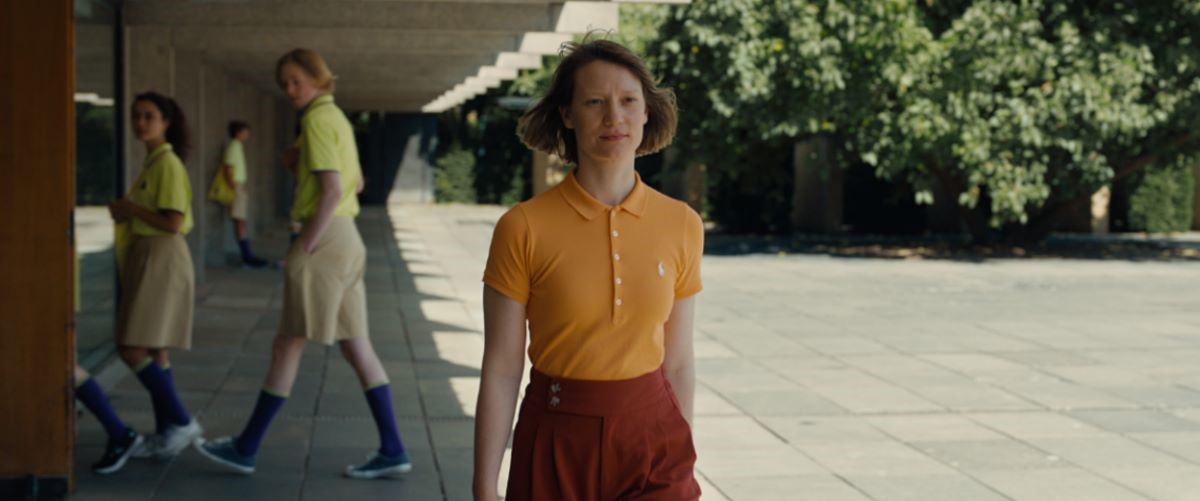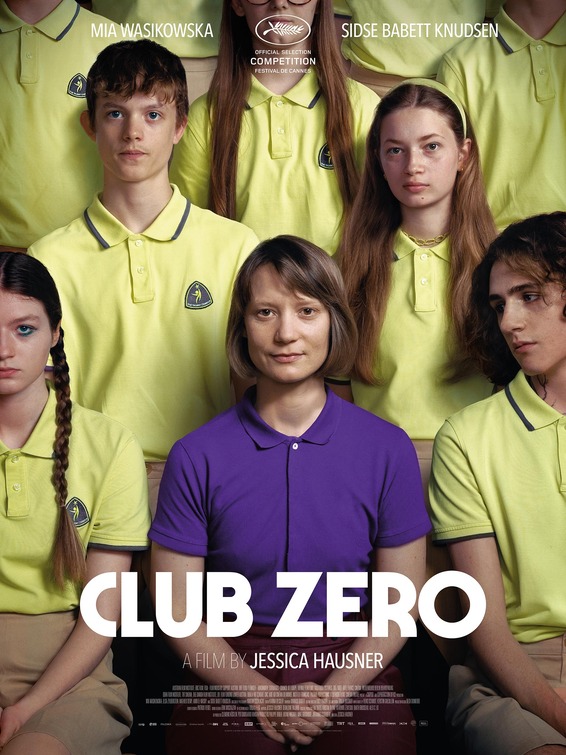Ambiguity and extreme emotional states occur simultaneously in Jessica Hausner’s films, where what “is” is not a simple question, and what we should take from all of it is equally obscured. Her characters are in extremis, and their emotional or spiritual states create a separate reality. The everyday business of going through life doesn’t come into play. There’s a monomaniacal devotion to one idea whether it is religious fanaticism in “Lourdes” (2009), the marriage of love and death in “Amour Fou” (2014), or the mesmerizing dark-magic orchids of “Little Joe” (2019). These films exist in a bell jar where rationalism has no place. Hausner’s new film, “Club Zero,” is an intense entry in her exploration of ideas run amok, of fantasy overtaking reality to the degree that reality itself is called into question (and regarded as an enemy).
The film takes place at a school for special or “difficult” kids. The school is expensive, and some of the parents are very involved in what goes on there, while others have clearly just dumped their kids off because they are too busy with their own lives to deal with a high-needs kid. The school uniform is extremely odd—yellow T-shirts and billowy khaki shorts, bright blue knee socks, white sneakers. A new teacher has appeared on the scene, Miss Novak (Mia Wasikowska), whose specialty is nutrition. She has developed a program called “conscious eating”, and she wears the almost beatific expression of a true fanatic. She speaks in measured tones, and the six or seven students, seated in a circle, are pulled into her orbit instantly. When she asks them why they are taking the class, the answers are varied. One student wants to save the planet. One wants to reduce her body fat. One wants to detach from consumerism. The scholarship student just needs the credit. This is the first scene in the film. The establishing shot of the classroom, its wood-paneled walls and mid-century Modern furniture, is static, almost like it’s from a security camera in the corner of the ceiling. When the kids go around the circle sharing their thoughts, it’s shot in a continuous sometimes dizzying pan. The kids all seem to be in a dissociated deadpan state. Perhaps this leaves them vulnerable to the workings of a master manipulator.
Miss Novak’s credo is that everyone needs to eat less. The way to achieve this is by taking deep meditative breaths before every bite, and reducing the amount you eat. Miss Novak says, “The slower you eat, the less food you’ll need.” Some of the kids resist, but most succumb to her program, almost like they’re under a spell. The kids all take on her beatific expression as they sit in the cafeteria, holding up a small forkful of food, breathing in and out with closed eyes, before slowly eating the morsel. They look at each other and smile. They feel elite, they feel special. They float through the hallways with a distracted air of superiority. It is behavior modification and brainwashing at work.
Miss Novak uses every cult-leader trick in the book. She creates an Us vs. Them mentality, separating the kids from their peers and, more worryingly, their parents. The parents are, of course, alarmed when their children stop eating, but Miss Novak reassures the students that their parents are trapped in “old beliefs”, and cannot be expected to understand. “Your parents don’t seem to see you for the way you really are.” Only she sees them. She holds self-confession sessions, where traumatized students admit they cheated and had something to eat. There’s love-bombing when a student accepts the program. The peer pressure to conform, and the resulting sense of togetherness, is addictive.
Naturally, in this environment, eating disorders are seen as not just normal, but preferable. Some of the other teachers are disturbed by what’s going on with these now-unreachable students, but some are inspired to try “conscious eating” themselves. Ambiguity is a hallmark of Hausner’s fascinating work. At times, it’s hard to tell what is being critiqued. The kids are so easily manipulated, and there is a warning implicit in this. Teens’ brains aren’t developed yet. They are vulnerable to suggestion by mesmerizing adults. Presenting what it means to live in service of a single ideology could also be a “critique”, but Hausner’s approach leaves room for interpretation. Ideology creates monsters. The belief in Utopias also creates monsters. Is that what we’re seeing? The parents are all pretty awful (except for Ben’s concerned working-class mother, played by Amanda Lawrence, who rings the alarm bell to school officials.) The film’s ambiguity might be frustrating to some people, particularly because it could be perceived as “endorsing” eating disorders (although that would be just an interpretation, and not one I share). The young cast (Florence Baker, Samuel D Anderson, Luke Barker, Ksenia Devriendt, and Gwen Currant) are completely believable in their eerie devotion to the project and to Miss Novak. The assurance that nobody in the cast lost weight for the film is a welcome addition to the end credits.
This is Hausner’s eighth collaboration with cinematographer Martin Gschlacht. Gschlacht’s cinematography completely de-stabilizes the already odd atmosphere. There are those clinical establishing shots of empty rooms, the camera slightly elevated, looking down on the characters. There’s also a calculated use of sudden zooms, or God’s-eye overhead shots, creating a paranoid and otherworldly atmosphere. The final shot, which reminded me of the culminating stanza in Helen Reddy’s extremely weird song “Angie Baby,” leaves you with more questions than answers. Cult leaders want to bring their followers to paradise, whether it’s on earth or in some other dimension. The goal is to separate people from contact with other humans who might sully the purity of their ideology.
What is Miss Novak’s end game? She crosses multiple lines in supplanting the parental units, as well as discouraging any intimacy between the students. She must be the kids’ sole focus. One girl is confronted by her terrified parents and her reply is full of what brainwashing expert Robert J. Lifton termed “thought-terminating cliches”, all memorized buzz words like a mantra: “Those who can live without food are free from all social and commercial pressure. Thus, we are threatening the capitalist system. This will be politically explosive.” Her ideology is so impenetrable it’s like Brutalist architecture. Anyone who has tried to talk sense into a fanatic, to poke holes in an ideology to a “believer,” knows the helplessness of the parental attempt.
“Club Zero” has a monotonous quality, ultimately, because existing with a Brutalist-architecture ideology is monotonous. Still, the film exerts an unnerving pull.




















